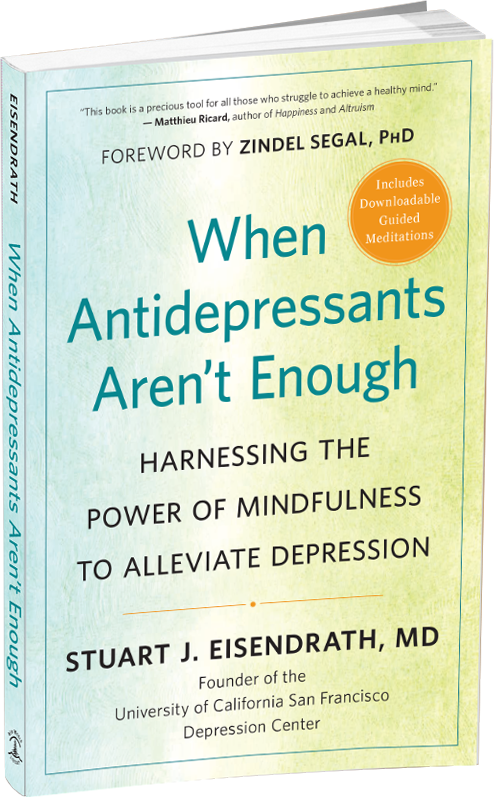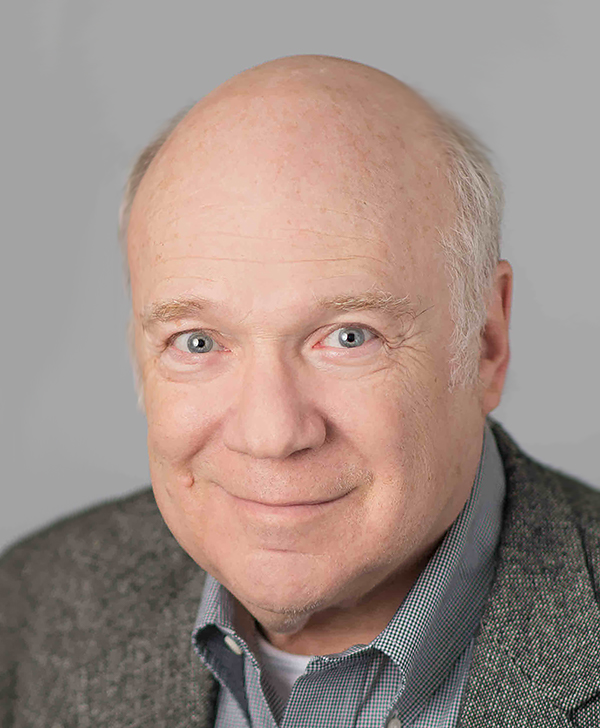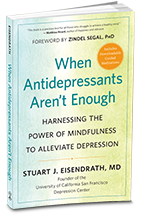The Power of Mindfulness

BY STUART EISENDRATH, MD
When Antidepressants Aren’t Enough
Over 50,000,000 Americans take psychotropic medications that are mostly antidepressants. Only half achieve lasting results. After a decade of research, Dr. Stuart Eisendrath and his team have found a treatment that helps people change their relationship with their thoughts and feelings. If you or someone you know suffers from clinical depression, reading this book can help.
BY STUART EISENDRATH, MD
When Antidepressants Aren’t Enough
Over 50,000,000 Americans take psychotropic medications that are mostly antidepressants. Only half achieve lasting results. After a decade of research, Dr. Stuart Eisendrath and his team have found a treatment that helps people change their relationship with their thoughts and feelings. If you or someone you know suffers from clinical depression, reading this book can help.
A Unique Approach to Treating Anxiety and Depression Backed by Research
This book is unique because it is written by a psychiatrist experienced in prescribing antidepressants and cognizant of their limitations. Dr. Eisendrath’s research has been funded by the National Institutes of Health and has been focused on clinical outcomes of depression treatments and the effects of such treatments on brain recovery. He was one of the early adopters of MBCT and rapidly began developing it as a modality for individuals currently in episodes of depression.
There is Help for Clinical Depression and Anxiety
If you have been suffering from clinical depression, this book can help. Over 100,000,000 people suffer from this debilitating illness worldwide. Many suffer from concurrent anxiety along with their depression. For some, antidepressants work well, but for many others they return less than satisfactory results. If you are someone who needs an alternative, there is help.
Depression and Anxiety Can Recur
Few people experience depression only once. Using Mindfulness-Based Cognitive Therapy (MBCT), you can change your relationship to your thoughts and feelings, particularly the depressive ones. This helps treat current depression and helps prevent relapse. Dr. Eisendrath walks you through the process step by step with exercises and examples. In as little as 8 weeks, When Antidepressants Aren’t Enough will lead you through the steps that fundamentally change your relationship to depressive thoughts and feelings—quickly, safely, and easily.
Years of Research and Experience
Dr. Eisendrath understands the limitations of antidepressants from years of experience and clinical research. In addition, his personal experience with depression makes him highly empathetic to those who suffer from this illness. Based on the award winning Practicing Alternatives to Heal Depression Study, When Antidepressants Aren’t Enough provides an appealing, feasible, and rapidly effective approach. It gives you the skills that you can employ to gain a sense of empowerment in coping with an illness that typically strips away your sense of control.
Available in Bookstores Locally or Online
If you’ve been on antidepressants and have failed to achieve full recovery or if you are not currently in treatment, the information in this book is important. When Antidepressants Aren’t Enough is available at amazon.com, bn.com and indiebound.org and your local bookstore.
Praise for When Antidepressants Aren’t Enough
What’s in This Book
Part 1
The Power of Now
In Part 1, Dr. Eisendrath lays the groundwork for your understanding and expectations. He shows you what mindfulness is and is not. Then he goes on to discuss how mindfulness helps with anxiety and depression by shifting your focus to the present moment and away from ruminations about the past or catastrophizing about the future.
Part 2
Changing Your Relationship to Your Mind and Thoughts
In Part 2, you’ll explore the mind and discover why your mind is not always your “friend.” Then you’ll go on to understand how thoughts are not equal to facts and begin to understand your “observing self.”
Part 3
Stumbling Blocks to Change and How to Overcome Them
Part 3 covers anxiety, depression’s frequent partner. After, you’ll explore anger and it’s impact on depression. Having an understanding of these 2 important factors is important to helping achieve lasting results.
Part 4
Lasting Ways to Achieve Happiness
In this final Part, Dr. Eisendrath discusses compassion and self-compassion are antidotes to anger and how they can buffer depression; how achievements and expectations relate to your happiness; the difference between pain and suffering; acceptance and other attitude shifts; and how to live well and keep your practice alive.
Studies show that mindfulness practices can…

Founding Director of the University of California San Francisco Depression Center
Stuart J. Eisendrath, MD
Stuart Eisendrath, MD is a Professor of Clinical Psychiatry Emeritus at the University of California, San Francisco. He has treated a full range of depressive disorders from mild to the most severe over the past 40 years using multiple modalities. Dr. Eisendrath’s lectures on Mindfulness-Based Cognitive Therapy (MBCT) for the the University of California TV (www.uc.tv) have been viewed over 1.5 million times. He was one of the early adopters of MBCT and rapidly began developing it as a modality for individuals currently in episodes of depression.
Dr. Eisendrath has been teaching and lecturing worldwide about MBCT for over 15 years and directed the Mindfulness training program in the University of California San Francisco Department of Psychiatry. He was the Founding Director of the University of California San Francisco Depression Center as well a founding board member of the National Network of Depression Centers. Dr. Eisendrath has won numerous teaching awards and is a Distinguished Life Fellow of the American Psychiatric Association. He also has a personal experience of depression that informs his efforts to bring MBCT to a wide audience.
From the forward…
“Stuart Eisendrath has worked at the frontier of depression care for most of his distinguished career and has seen firsthand the merits and limitations of the myriad of approaches used to treat depression. The particular wisdom conveyed in these pages reflects the view that, for a large majority of patients, effective treatment of depression is not likely to be achieved via a single modality. Rather, effective care will involve sequencing interventions to enable patients to harness the benefits of multiple inputs.”
“This easily accessible and carefully crafted book provides readers with a clear-sighted distillation of the clinical wisdom behind MBCT and its particular capacity to address the mind states that often fuel and perpetuate depression. Two helpful conceptual views capture the essence of the approach and allow readers to move into a more fine-grained analysis of the ways these principles can be pragmatically applied on a daily basis.”
Insights from the text…
“One of the difficulties with depression is that not only do we have a tendency to make critical evaluations and judgments, but we accept them as if they are facts.”
“Thoughts, even the ones we may believe most strongly, are merely passing mental events and not facts to be taken literally.”
“When depressive episodes hit, you must see them for what they are: recurrences of your illness and not personal weakness or moral failure.”
“In mindful approaches to depression, the key is not to find the origins of negative feelings, but to change your relationship to them, so they no longer have significant power in your life.”
“Can you accept your suffering in this moment, right now? If you can do that and stop forecasting the future, your current pain will diminish too.”
“Mindfulness is focused on the present moment. It is released from the past or the future.”
Get in Touch
Copyright ©, Dr. Stuart J. Eisendrath. All rights reserved.
Read the Terms of Use and Privacy Policy.
Website design and development by White Light Concepts, LLC.






